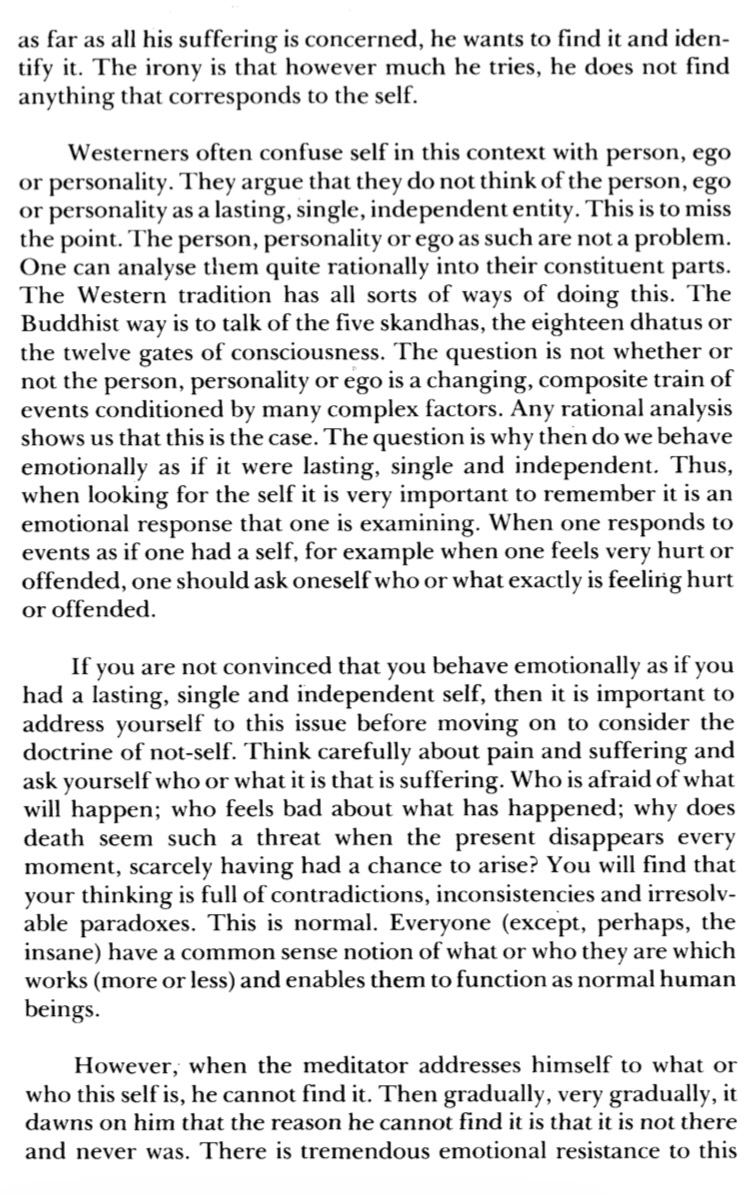excerpted passage
It is commonly called “noting”, and has its origins in Sutta 111 of the Middle Length Discourses of the Buddha (or Majjhima Nikaya [MN], very worthwhile reading), usually referred to as MN 111, called “One by One as They Occurred”, and in MN 10, Satipatthana Sutta (variously translated as “Four Foundations of Mindfulness”, or “Frames of Reference”, etc.), as well as Sutta 22, Mahasatipatthana Sutta (“Greater Discourse on Mindfulness”) of the Long Discourses of the Buddha (or Digha Nikaya [DN]), usually referred to as DN 22. Noting is used primarily in the Mahasi Sayadaw insight tradition from Burma, though related exercises can be found in various Zen traditions, notably Soto Zen and Korean Chan, such as repeatedly asking, “What is this?”
Noting is the exercise that gained for me the most breaks and insights in my early practice, particularly when done on retreats, and because of that my enthusiasm for it is extreme. I still consider it the core foundation of my early to middle practice, the technique that I fell back on when things turned difficult or when I really wanted to push deep into new insight territory.
…
The practice is this: make a quiet, mental one-word note of whatever you experience in each moment. Try to stay with the sensations of breathing, which may occur in many places, noting these quickly as “rising” (as many times as the sensations of the breath rising are experienced) and then “falling” in the same way. These are the fundamental insight practice instructions. When the mind wanders, notes might include “thinking”, “feeling”, “pressure”, “tension”, “wandering”, “anticipating”, “seeing”, “hearing”, “cold”, “hot”, “pain”, “pleasure”, etc.
Note these sensations one by one as they occur and then return to the sensations of breathing. When walking, note the feet moving as “lifting” and “placing”, or as “lifting”, “moving”, and “placing” as you perceive each of the many sensations of all those processes, noticing other sensations as they arise and returning simply to the sensations of the feet walking.
The details of this practice can be found in such books as Practical Insight Meditation, by Mahasi Sayadaw, which I highly recommend, available free online in various places and in book form. This is my all-time favorite dharma book. It is short and to the point. Its instructions work and the promised effects are reproducible. The first forty-two pages are total gold. There is no need for me to repeat much of the useful information found there, as it is pithy and now readily available online.
I just did this for a whole bike ride, noting everything that caught my attention. It’s far from “focused” but I remained aware the entire during, while losing track of time and thus impatience. Usually I get lost in thought when I try to be mindful, but I was able to simply label a thought or perception and move on. There are a lot of sensations if you pay attention so it will be challenging but that’s what keeps the mind engaged. You don’t need to be aware of everything at once, just wherever your attention is at a given moment. As well as other benefits, I feel like being aware of how everything is constantly changing helps one perceive life as more novel and thus less boring and miserable.
I’m sure it’s great if you’re not ADHD as well, as that’s the case with the author.
Extremely good stuff. Wonder if this would work when doing things one has a hard time pushing themselves through due to under stimulation as well, like daily chores
With meditation, the worst thing you can do is try*
*With the exception that if you are experiencing delusions or overwhelming paranoid thoughts or you are hearing very hostile thoughts then it's not the right time to learn meditation and sitting with experiences like these in meditation can risk aggravating them.
There's a story about a monk named Cudapanthaka who achieved enlightenment through meditating while doing his chores. I think it's in the Madhyamaka tradition. So, if that story is to be believed, then it meditation during chores would certainly work.
Maybe. It’s hard to be consistent with it but my mind loves to do things in the background and while it’s recently been pondering pointlessly at times I have had it frequently coming back to the present moment: proprioception, observing sensations, insight into non-self, impermanence, and unsatisfactoriness. It has been pleasant at times. Lately, I’ve been listening to Buddhist audiobooks to help with initiating mindless tasks. I’ve also found that the insight practice of asking where the self is can help with anxiety and pain.
http://www.wearesentience.com/uploads/7/2/9/3/7293936/progressive-stages-of-meditation-on-emptiness.pdf